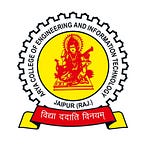Top 8 Water Management Trends & Innovations in 2024
Arya College of Engineering & IT, Jaipur is recognised as a major contributor to the water resources engineering & management and watershed development & management at the national level.
1. SmartWater Management: Utilizing IoT, AI, and smart meters to track and manage water resources in real-time, improving efficiency, and reducing waste.
2. WastewaterProcessing: Advanced water treatment methods, such as membrane filtration, UV disinfection, and ozone treatment, for better water quality and resource recovery.
3. AdvancedFiltration: Innovative filtration techniques, including nanofiltration and ultrafiltration, for improved water treatment and purification.
4. FloodPrevention: Using drones, weather radars, and other technologies to monitor water levels and prevent flooding, ensuring water safety and resource management.
5. Water-savingtechnology: Smart irrigation systems, low-flow fixtures, and other water-saving solutions to conserve water resources.
6. DecentralizedInfrastructure: Decentralized water infrastructure, such as rainwater harvesting systems and onsite wastewater treatment, to improve access to drinking water in remote areas.
7. InnovativeMaterials: Novel materials, like graphene-based membranes, for more efficient and sustainable water treatment and filtration.
8. Desalination:Advanced desalination technologies, such as reverse osmosis and electrodialysis, for converting seawater into freshwater.
9. Real-TimeWater Quality Monitoring: Continuous monitoring of water quality in remote locations, ensuring sustainable and safe water resources.
10. Technology-DrivenReduction in Water Distribution Leakage: Innovative technologies, such as advanced sensors and data analytics, to detect and fix water leakages, conserving water resources and reducing operational costs.
11. RemoteSensing of Water: Remote sensing technologies for water accounting, non-revenue water remediation, and water management.
12. SmartIrrigation: IoT-enabled smart irrigation systems for efficient water use in agriculture.
13. WaterQuality Control: IoT-enabled water quality control systems for real-time monitoring and management.
14. DistributedTechnology: Distributed technology for expanding water and wastewater services to remote areas.
15. Low-Costand Effective PFAS Remediation: Innovative solutions for removing per- and polyfluoroalkyl substances (PFAS) from water.
16. MagneticCell-Enrichment Technology: Attractive solutions for water treatment and resource recovery.
17. BiodegradableDisinfectants: Natural disinfecting micelles based on ionic liquids for water treatment, reducing bacterial resistance.
18. Chemical-FreeWastewater Removal Treatment: Cost-effective and chemical-free water treatment for removing dyes and producing nitrogen fertilizer.
19. ReplacingGlass pH Electrodes with Metal: More robust metal electrodes for pH sensing in water samples, improving durability and reducing fragility.
20. SparklingWater Treatment Using Nanobubbles: Cost-effective and chemical-free nanobubble generation for water treatment, with minimal impact on water quality and aquatic life.
How do smart water meters work
Smart water meters work by utilizing advancedtechnology to measure and monitor water consumption accurately and in real time. These meters consist of several core components that enable their functionality:
1. HighlyAccurate IoT Sensor: Smart water meters are equipped with a highly accurate sensor, typically based on ultrasonic or electromagnetic principles, that measures water flow precisely as it passes through the meter.
2. MicrocontrollerUnit (MCU): The meter includes a microcontroller unit that processes data collected by the sensor. The MCU can analyze water consumption patterns, detect leaks, and provide real-time data for better decision-making.
3. WirelessCommunication Modules: Smart water meters are equipped with wireless communication modules such as cellular, Wi-Fi, or LoRa. These modules enable seamless data transmission, allowing for remote monitoring of water consumption and prompt identification of anomalies.
